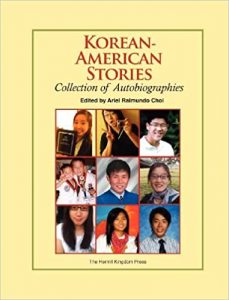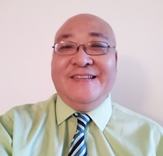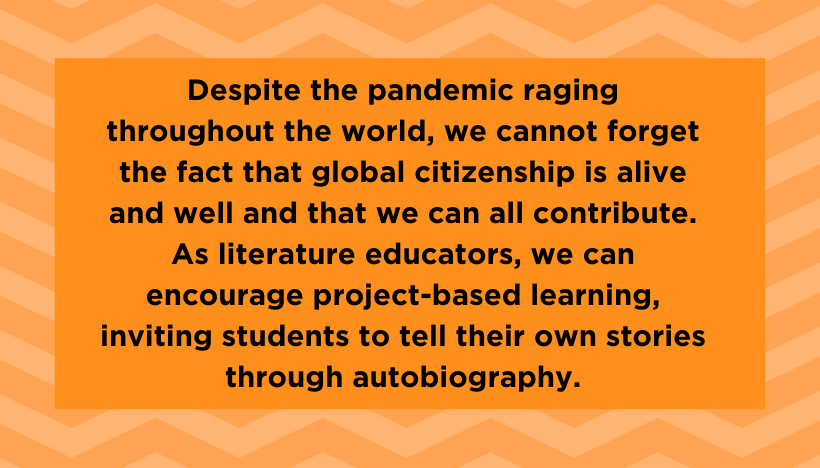From the NCTE Standing Committee on Global Citizenship
This post was written by NCTE member Heerak Kim, a member of the NCTE Standing Committee on Global Citizenship.
“I realized I was following a tradition established by Frederick Douglass—the slave narrative—speaking in the first-person singular, talking about the first-person plural, always saying ‘I,’ meaning ‘we.’ ” —Maya Angelou
As committee members of the Standing Committee on Global Citizenship, we have pondered what it means to contribute to the world as global citizens. This quote from the American poet and civil rights activist Maya Angelou regarding autobiography writing suggests the power of telling one’s own stories in one’s own words, prompting me to consider more strategically the ways in which autobiography can contribute to global citizenship.
Autobiography is written by a single person but often testifies to the experiences of many who might share that person’s identity. In a sense, therefore, autobiography represents the power of participatory identity or representative group identity. The autobiography is a voice of a people, channeled through the person writing their autobiography.
In this regard, no one suffers alone. There is collectivity to the suffering. Many can identify with this, particularly during COVID-19 global pandemic. When an area is under a lockdown and all the restaurants close their dining rooms, there is a shared loss or grief in the community. There is also a common sense of loss that is evoked among community members of a hot-spot area when they bear witness to their fellow residents dying from COVID-19.
Collective memory and experiences are not all tragic, however. Even in the greatest tragedy, people find humor and positivity, which they share through art, literature, and music.
In the current climate, that could be in the form of a Zoom meeting, where each instrumentalist plays their own music in the private space of a tiny Zoom window. But the many small Zoom windows on the computer screen come together to provide a symphony that is distinctive to our shared COVID-19 experience. Perhaps we can call it “the COVID-19 Cultural Experience.”
Despite the pandemic raging throughout the world, we cannot forget the fact that global citizenship is alive and well and that we can all contribute. As literature educators, we can encourage project-based learning, inviting students to tell their own stories through autobiography. From here, we can even seek a publisher to publish the collective work, to be shared throughout the world.
 In this regard, I find one particular collection of autobiographies enlightening. Korean-American Stories: Collection of Autobiographies, edited by Ariel Raimundo Choi, shares autobiographies in which “I” means “we.” Raimundo Choi reflects on his personal experience as a Hispanic-Korean-American, an ethnic Korean born in Argentina who later immigrated to the United States. Ye One Chung identifies herself with Israel, the country where she grew up and subsequently wrote her autobiography, in Hebrew with an English translation provided. Reading through Korean-American Stories: Collection of Autobiographies, one comes to understand the beautiful diversity of global citizenship.
In this regard, I find one particular collection of autobiographies enlightening. Korean-American Stories: Collection of Autobiographies, edited by Ariel Raimundo Choi, shares autobiographies in which “I” means “we.” Raimundo Choi reflects on his personal experience as a Hispanic-Korean-American, an ethnic Korean born in Argentina who later immigrated to the United States. Ye One Chung identifies herself with Israel, the country where she grew up and subsequently wrote her autobiography, in Hebrew with an English translation provided. Reading through Korean-American Stories: Collection of Autobiographies, one comes to understand the beautiful diversity of global citizenship.
English language arts teachers in pre-K to 12th grade and college professors teaching in departments of English and literature can encourage discussion of the complexities of global citizenship by engaging in reading autobiographies such as those contained in Korean-American Stories: Collection of Autobiographies. This can be a generative multicultural experience.
Our shared pandemic experiences can provide similar opportunities for writing about “I,” meaning “we.” A classroom teacher can encourage each student to write about their own family’s day-to-day experiences during the pandemic. Since COVID-19 has impacted every aspect of everyone’s life in the United States, allowing opportunities for expression of this new experience can provide a nuanced portrait of the realities of different cultural experiences in America.
As literature educators, we can contribute to the engagement and production of this genre of literature that can be educational, engaging, and even therapeutic. There is power in the written word, and reading and writing autobiographies can usher in greater participation in global citizenship.
 Heerak Kim is writing his Ed.D. dissertation at the American College of Education on improving urban schools and is the vice president of its chapter of Kappa Delta Pi International Honors Society in Education. Heerak is the author of Bat Yam: A Novel and Jewish and Indian and Other Stories.
Heerak Kim is writing his Ed.D. dissertation at the American College of Education on improving urban schools and is the vice president of its chapter of Kappa Delta Pi International Honors Society in Education. Heerak is the author of Bat Yam: A Novel and Jewish and Indian and Other Stories.
“The Standing Committee on Global Citizenship works to identify and address issues of broad concern to NCTE members interested in promoting global citizenship and connections across global contexts within the Council and within members’ teaching contexts.”
It is the policy of NCTE in all publications, including the Literacy & NCTE blog, to provide a forum for the open discussion of ideas concerning the content and the teaching of English and the language arts. Publicity accorded to any particular point of view does not imply endorsement by the Executive Committee, the Board of Directors, the staff, or the membership at large, except in announcements of policy, where such endorsement is clearly specified.

